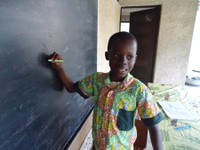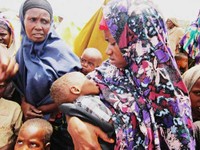Years before Live Aid
1971 (14 years before Live Aid) 
Cote d'Ivoire: Invited by a retiring Priest, SOS Children take over a Roman Catholic orphanage in Abobo Gare, Abidjan (the main bus station) in Abidjan, Cote d'Ivoire and transform it from an orphanage to providing family-based care in an SOS Children's Village, the first in the continent of Africa. A primary school for local children was included in this modest start for SOS Children in Africa.
Uganda: the first prime minister of Uganda, Milton Obote, falls in a military coup led by Idi Amin.
Ghana: SOS Children opens its first community in Ghana in Tema.
1972 (13 years before Live Aid)
Uganda: Amin orders 60,000 Asians to leave Uganda
1973 (12 years before Live Aid)
Rwanda: the first president of Rwanda since independence (Gregoire Kayibanda ) is ousted in a coup d'etat by Juvenal Habyarimana who introduced one party rule and remained in power for two decades until the Rwandan genocide. Rising commodity prices bring some prosperity, but there is a rapid decline into poverty.
1974 (11 years before Live Aid)
Ethiopia: Around 200,000 people die in Northern Ethiopia as a result of famine. Emperor Haile Selassie is toppled by a communist military Junta (the Derg).
Ethiopia: SOS Children start constructing a Children's
Village in Makalle, the capital of Tigray in Northern Ethiopia, where
most of the children orphaned by the famine lived. As well as family
based care for orphans, the Village has a small model farm to promote
self-sufficiency and teach farming methods, a medical centre, a primary and secondary school and a large "Family Strengthening Program" to keep local vulnerable families together.
1976 (9 years before Live Aid)
Burundi: A bloodless coup d'etat installs Colonel Bagaza as president, leading to a period of relative calm albeit with little political or religious freedom. Eight years later Bagaza's position as president was legitimised by election before he was ousted in a coup.
Uganda: Idi Amin declares himself "President for Life" and lays claim to land in Kenya and Tanzania.
1977 (8 years before Live Aid)
Burundi: Relative peace provides an opportunity for SOS Children to provide conflict orphans with family based care in an SOS Children's Village in Gitega as well as a medical centre and a primary and secondary school.
Somalia: Somalia invades Ethiopia and attempts to seize the Ogaden region, but fails.
1978 (7 years before Live Aid)
Ethiopia: Thousands of government opponents die in a "Red Terror" campaign by the Derg; collectivisation of farming begins; Tigrayan People's Liberation Front launches war for regional autonomy.
Rwanda: The situation of widespread poverty in Rwanda
has destroyed any community capacity for orphans. Seeing children in
such need drives SOS Children to enter Rwanda and set up family based
care for orphans in an SOS Children's Village in Kigali as well as a medical
centre and a primary and secondary school.
Uganda/Tanzania: A war between Tanzania and Uganda leads in 1979 to the overthrow of Idi Amin in Uganda.
1979 (6 years before Live Aid)
Uganda: Yusufu Lule installed as president, but is quickly replaced by Godfrey Binaisa.
1980 (6 years before Live Aid)
Rhodesia: Zimbabwe ends the 16 year Rhodesian bush war.
Uganda: The army deposes President Binaisa and organises elections which are won by Milton Obote.
Algeria: A massive earthquake hits El Asnam in Algeria, reaching 7.7 on the Richter Scale. Approximately 5,000 die; SOS Children makes an offer to build a Children's Village in Algiers to aid those affected by the catastrophe.
1984 (1 year Before Live Aid) 
Ethiopia: Four heavily populated Ethiopian provinces—Tigray, Gojjam, Hararghe, Tigray, and Wollo—experience record low rainfalls. Simultaneously, the government of Ethiopia is struggling with regional uprising which is the focus of its attention. Nearly one half of the Ethiopian Gross National Product is being spent on defence. The resulting famine affects Eritrea and Ethiopia, causing hundreds of thousands of deaths, and leaving millions of people destitute from loss of lifestock. The famine is widely televised and causes shock throughout the West.
Ethiopia: SOS Children launches an emergency relief program to help those around its well established Village in the middle of the famine area.

 Return to Schools Wikipedia Home page…
Return to Schools Wikipedia Home page…
